"Well it used to be witches. At least they don't burn you."
The film stars Dirk Bogarde (The Blue Lamp, Five Angles on Murder, The Stranger in Between, Cast a Dark Shadow) as Melville Farr, Sylvia Syms as Laura Farr, Dennis Price as Calloway, Nigel Stock as Phip, Peter McEnery as Boy Barrett, Donald Churchill as Eddy Stone, Anthony Nicholls as Lord Fullbrook, Hilton Edwards as P.H., Norman Bird as Harold Doe, Derren Nesbitt as Sandy Youth, Alan MacNaughtan as Scott Hankin, Noel Howlett as Patterson, Charles Lloyd-Pack as Henry, John Barrie as Detective Inspector Harris, John Cairney as Bridie, David Evans as Mickey, Peter Copley as Paul Mandrake, Frank Pettitt as Barman, Mavis Villiers as Madge, Margaret Diamond as Miss Benham, Alan Howard as Frank, Dawn Beret as Sylvie, John Bennett as Undercover Detective (uncredited), John Boxer as Policeman in Cell (uncredited), Frank Thornton as George, Henry's assistant (uncredited).
 |
| Dirk Bogarde as Melville Farr |
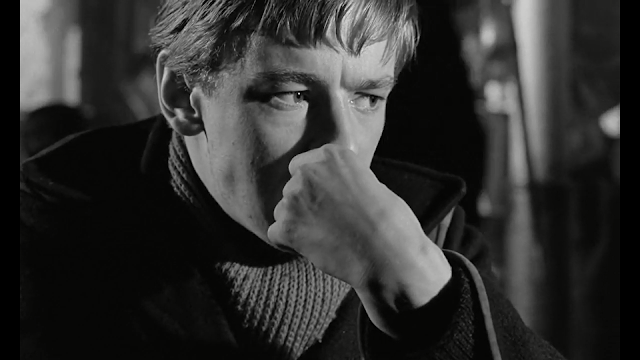 |
| Peter McEnery as Boy Barrett |
 |
| Sylvia Syms as Laura Farr |
"Victim is a 1961 British neo noir suspense film directed by Basil Dearden and starring Dirk Bogarde and Sylvia Syms. It was the first English-language film to use the word "homosexual". It premiered in the UK on 31 August 1961 and in the US the following February. On its release in the United Kingdom, it proved highly controversial to the British Board of Film Censors, and in the U.S. it was refused a seal of approval from the American Motion Picture Production Code." (From Wikipedia, the free encyclopedia)
Melville Farr. Barrister. Married. Wife Laura. Self assured. Successful. Slotted to become Queens council, and possibly appointed a judge. (For those who have no idea what a Queens council is, its barrister who is chosen to represent the British royal family in a court of law.) Apparently happily married. Apparently because he's bi.

However the whole business is treated in a staid, antiseptic, manner. For instance, Farr is depicted as never giving in to his tendencies. Wife Laura knows of these tendencies, Farr told her himself, and she is OK with it as long as Melville doesn't act upon them. The blackmail photo doesn't show any consensual sex, just Farr with another man who is crying. Its so toned down, that the most flamboyant "gay" looking character, is the blackmailer.
 |
| Boy Barrett sees Scotland Yard arrive at the construction office and panics |
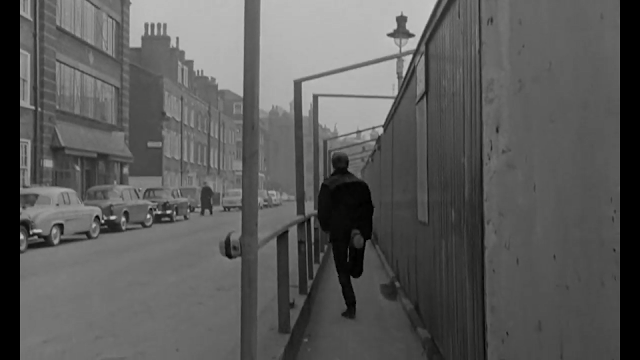 |
| Barrett runs from the construction site |
Jack "Boy" Barrett. High rise construction company clerk. Desperate. Farr's male lover (wannabe). Boy stole money from his company. Boy is being blackmailed. Homosexuality in Britain at that time was illegal.
"Homosexual acts between males were illegal in England and Wales until the 1967 Sexual Offences Act, which implemented the recommendations of the Wolfenden report published a decade earlier. The fact that willing participants in consensual homosexual acts could be prosecuted made them vulnerable to entrapment, and the criminalisation of homosexuality was known as the "blackmailer's charter"" (Crowther, Bosley (6 February 1962). "'Victim' Arrives: Dirk Bogarde Stars in Drama of Blackmail". New York Times.)
Boy was being blackmailed with a photograph of him and Farr in a car. The blackmailers M.O. is to send incriminating photos in plain brown envelopes to their victims and threaten exposure to authorities if they don't pony up dough. Boy didn't have it. Boy was desperate. He stole £2,300 from his employers at the construction site. They find out the shortage, and when the coppers show up at the job site office, Boy flees. He tries to hit up his friends for help and decides to skip town but he is decent enough to try and warn Farr that he is in danger.
Now the kicker is, that at the time that the photo was taken, it was when Farr was breaking it off for good with Boy. So whenever Boy tries to phone Farr to warn him, Farr thinking it's just a desperate ex-lover, trying to rekindle their relationship. Farr brushes off all the calls, telling his secretary to say that he's not in.
 |
| Norman Bird as Harold Doe gives no help |
Boy gets picked up by the police and hauled off to the slammer. Boy knows he won't hold up if he is interrogated and will disclose the blackmail scheme and subsequently expose himself to whatever the Brits call a "morals charge." So he hangs himself in his cell.
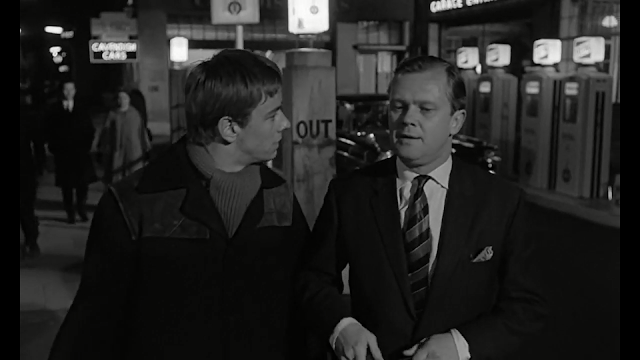 |
| gets some traveling money from Phip played by Nigel Stock |
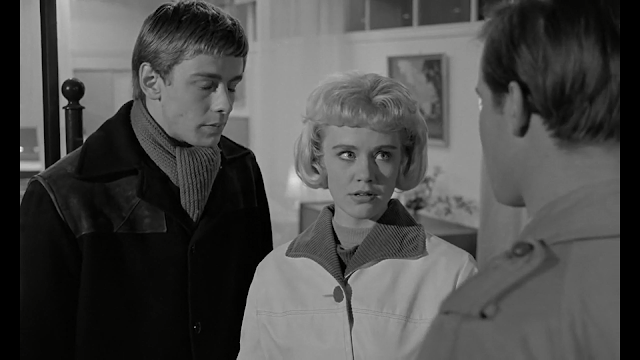 |
| Boy's straight friend and his wife |
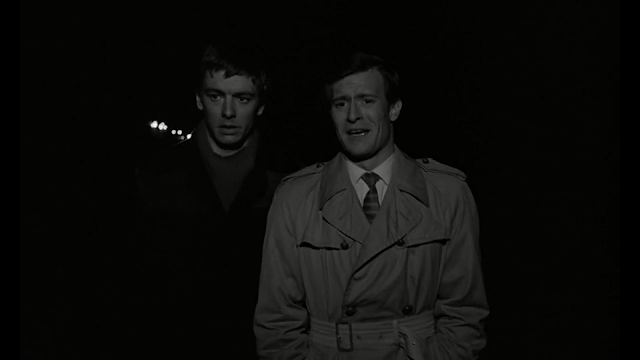
 |
| The cops close in |
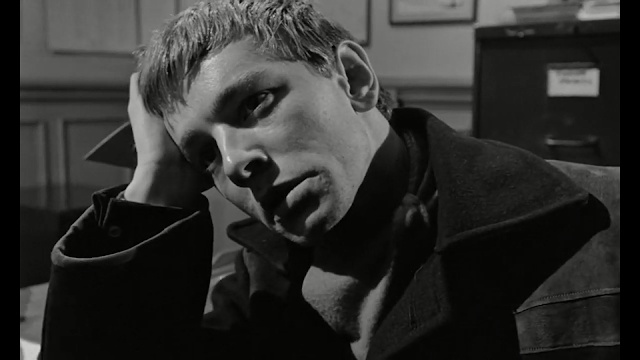 |
| Boy wont talk |
When Farr learns about Boy's demise he becomes determined to break the blackmailers even at at the risk of his coming out in public as gay. With the help of Boy's straight friend they try and find out clues to the blackmailer's identity. In effect they become the de facto detectives, at first, no one that knew Boy acknowledges to being blackmailed. It goes Noirsville when a barber they questioned later has his shop damaged by the blackmailer. The weak hearted man suffers a heart attack. He dramatically calls Farr and names another blackmail victim before dying saving the day.
Its hard in this day and age to believe that this was controversial to the British Board of Film Censors, and never was "officially" released in the U.S.
Noirsville
 |
| Derren Nesbitt as blackmailer Sandy Youth |
Victim was premiered at the Odeon Cinema in Leicester Square on 31 August 1961. It premiered in the US in New York City at two theaters on February 5, 1962. It was the only British entry in the Venice Film Festival in 1961, where an Italian critic commented: "at last the British have stopped being hypocrites". (IMDb)
"Along the way we catch fantastic glimpses of late 50s/early 60s London, particularly St Martins Lane, Cambridge Circus and Chiswick Mall. There are several scenes shot inside The Salisbury pub which apparently was a gay pub at the time, although not openly presumably." (IMDb - christopher-underwood25 August 2017)
The acting by all the principles is flawless the cinematography excellent. 8/10
Internalized Homophobia Can Twist A Soul (IMDb - bkoganbing21 September 2008)
Five years before Parliament repealed the sodomy laws in Great Britain, unfortunately too late for the colonies they had already let go in the third world who still have vigorously enforced sodomy laws on the books, Basil Dearden directed this ground breaking film Victim about a group of gay men being blackmailed.
The ring starts to unravel when young Peter McEnery is caught embezzling funds from his construction firm. But this embezzler is hardly living it up considering the money he's taken. When the police investigate and try to get the truth out of him, McEnery hangs himself in his cell.
What else back then could he have done he thought? He was guilty of breaking the law for an act of love that could have gotten him jail time. One of the people McEnery thinks of when he looks for money to quickly leave the United Kingdom was barrister Dirk Bogarde. But Bogarde refuses to see him.
Bogarde was like so many gay men who even today still live in the closet because of pressure in the areas they do live and in the professions they are in. But back then being open could close a lot of career doors to one. But his back is up and he's figuring whoever is blackmailing McEnery will be knocking on his door shortly.
Of course the hard part is telling wife Sylvia Sims of his predicament. He's married to her because convention expects it. He was in fact more open with her about his life than either Heath Ledger or Jake Gyllenhaal was in Brokeback Mountain, but he said to her he'd left all that behind when he took the marriage vows. I'm sure he tried also in his own way.
And he's feeling guilty a bit about McEnery's death. It sends him on a quest to flush these bottom feeding slime balls out from under the rocks they were hiding under.
Bogarde of course was a closeted gay man himself and never quite came out in his life. He was in a committed relationship for over 40 years and was at the time of Victim. Another closeted gay man was Dennis Price who has a small role as an actor and another of the blackmailer's victims. These two guys were taking daring steps for 1961.
What I liked best about this film was the portrayal of the young blackmailer Derren Nesbitt. He hangs around the gay haunts of 1961 London at the time with his latest camera equipment just taking all kinds of candid shots for future use. There's a scene in his room where he's talking real tough on the phone to one of his victims. He gets up off his bed to leave the room and the camera takes in a picture on the wall of an anatomically correct Greek statue. This poor wretch of a human being was fighting his own feelings because of what society told him was wrong. Internalized homophobia can twist a soul like nothing else. That Basil Dearden was farsighted enough to pick up on that in people and use it in the film is commendable.
Bogarde knows his career will be in the toilet but does it anyway. I'd like to think when those laws were repealed which they would be later in the Sixties, he could pick the pieces up. Many never could.
Which brings to mind one of my claimants from my former job at New York State Crime Victims Board. A dear little man named Ernie who is probably not with us any longer. He was living in an SRO in New York City and was assaulted by a trick he picked up in the mid Eighties, Ernie was in his early sixties.
When I got to know him, I found out that he had a degree in political science and had graduated before World War II from the Columbia University School of Far East Studies. He had hopes to enter the Foreign Service, but the McCarthy era discouraged that. Back then he was a 'security risk' because of his sexual orientation. So robbed of the career he could have had by homophobia he slid gradually down the societal scale until I met him. He made a living doing secretarial temp work when he wasn't abusing a lot of substance.
As surely as Dirk Bogarde's career went, so did Ernie's in real life. And this review is dedicated to Ernie and all the others like him who could not realize their full potential because of some archaic mores.
British reviews praised Bogarde's performance as his best and praised his courage in taking on the role. A London magazine called it "the most startlingly outspoken film Britain has ever produced".[Watts, Stephen (8 October 1961). "Noted on the British Film Scene"] An anonymous reviewer in The Times commented that "Victim may not say a great deal about" the related issues of the nature of 'love' and gay men's "genuine feeling" for each other, "but what it does say is reasoned and just; and it does invite a compassionate consideration of this particular form of human bondage".[ "Intelligent Film on Homosexuality". The Times. 30 August 1961. p. 11.] However the Sight and Sound reviewer Terence Kelly saw problems with the film, and wrote that Victim contains "a tour of the more respectable parts of the London homosexual underworld, with glimpses of the ways in which different men cope with or are destroyed by their abnormality". He did comment "the film unequivocally condemns the way" blackmail "is encouraged by the present state of the law".[Kelly, Terence (Autumn 1961). "Victim archive review: Dirk Bogarde fronts a courageous, landmark thriller". Sight and Sound. ]
Bosley Crowther wrote that the film "appears more substantial and impressive than its dramatic content justifies" because "it deals with a subject that heretofore has been studiously shied away from or but cautiously hinted at on the commercial screen". He thought the script "routine" and "shoddily constructed" as drama but successful as a political argument:[Crowther, Bosley (6 February 1962). "'Victim' Arrives: Dirk Bogarde Stars in Drama of Blackmail". New York Times. ...which came to the Forum and the Murray Hill yesterday]
"As a frank and deliberate exposition of the well-known presence and plight of the tacit homosexual in modern society it is certainly unprecedented and intellectually bold. It makes no bones about the existence of the problem and about using the familiar colloquial terms. The very fact that homosexuality as a condition is presented honestly and un-sensationally, with due regard for the dilemma and the pathos, makes this an extraordinary film."
He qualified his praise of Bogarde's acting: "Dirk Bogarde does a strong, forceful, forthright job, with perhaps a little too much melancholy and distress in his attitude, now and again." He summed up his mixed view: "While the subject is disagreeable, it is not handled distastefully. And while the drama is not exciting, it has a definite intellectual appeal."
Chris Waters however has argued that "Victim took for granted that homosexuality was a social problem that needed to be explored calmly and dispassionately" as a result of the "wake of the social dislocations associated with the war and the various anxieties to which they gave rise".[ Waters, Chris (July 2012). "The Homosexual as a Social Being in Britain, 1945 -1968". Journal of British Studies. 51] He elaborates on this further by referring to Kenneth Soddy, a physician at the Department of Psychological Medicine at University College London Hospital, who wrote in 1954 that whilst homosexuality itself didn't trouble the community, its "social disturbance" during the war caused "variations in social and sexual practices which engenders attacks of acute public anxiety."[Soddy, Kenneth (11 September 1954). "Homosexuality". Lancet. 264] As such, he argues that the film portrays homosexuality in a sensationalized way which would have deliberately drawn public attention to the issue.
Before the film was released in the U.S., a news report in The New York Times described Victim as a political work: "the movie is a dramatized condemnation, based on the Wolfenden Report, of Britain's laws on homosexuality."[ "British Movie on Homosexuality Denied Seal of Approval Here" (PDF). New York Times. 16 November 1961.]
In relation to a BFI Southbank retrospective screening season of Bogarde's films, Peter Bradshaw argues that fifty years on, Victim does not function necessarily "as a study of homosexuality," but rather of "blackmail and paranoia." He points out the fact that Melville never engages in homosexual acts, but rather "appears" to have a "passionate, unconsummated infatuation with a young man at university..." then later a liaison with a "young building-site worker", both unconsummated arrangements to prove his interest. He argues Bogarde's lighting is more haunting than necessary in the confrontation scenes with his wife, and references the work of Patrick Hamilton, which often depicted "the seedy, nasty world of pubs and drinking holes around... London's West End", seen throughout the film that add to "the strange, occult world of blackmail, conspiracy and shame, and the seediness of a certain type of London, that Victim holds up best."[ "Dirk Bogarde's Victim shines a light on London's shadowy past". the Guardian. 8 August 2011. Retrieved 9 December 2020.]
Victim became a highly sociologically significant film; many believe it played an influential role in liberalising attitudes and the laws in Britain regarding homosexuality.[Greenfield, Steve; Osborn, Guy; Robson, Peter (2001), Film and the Law, Routledge, p. 118] Alan Burton has also highlighted that in spite of attracting "much criticism and debate, largely in terms of its liberal prescriptions and its ‘timid’ handling of a controversial theme", confirmed in that a study that Victim had "significant impact on gay men who struggled with their identity and subjectivity at a time when their sexuality was potentially illegal".[Burton, Alan (2010). "Victim (1961): Text and Context". AAA: Arbeiten aus Anglistik und Amerikanistik. 35]
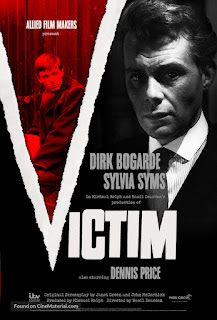
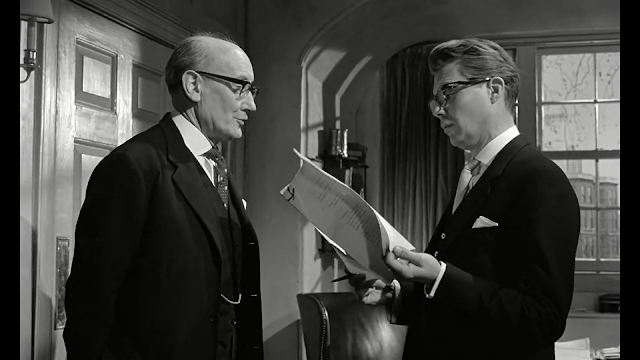
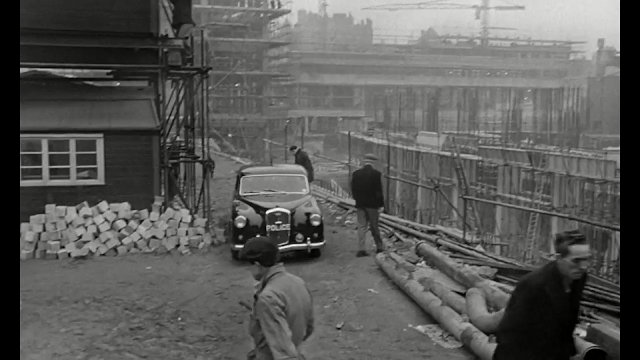
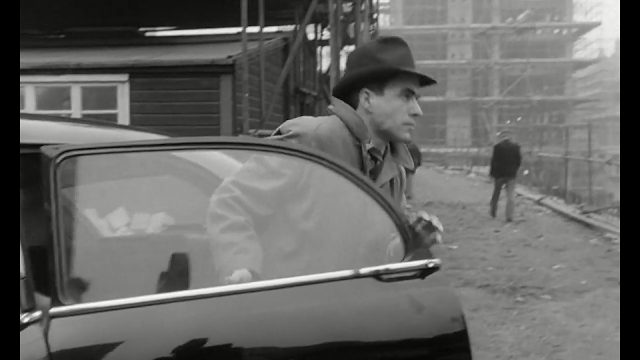

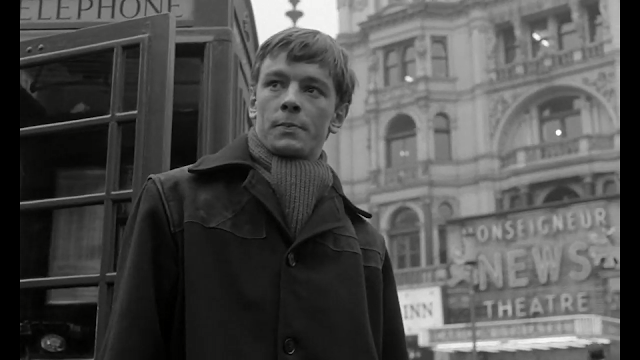


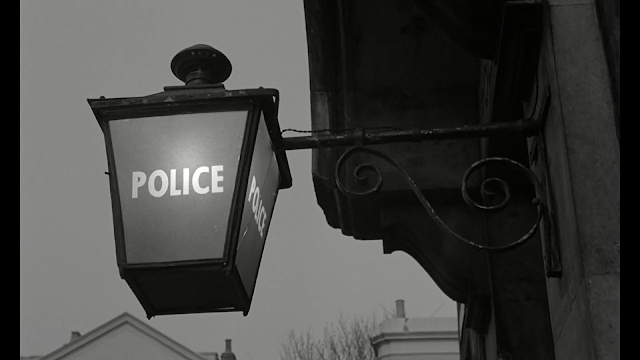





























































No comments:
Post a Comment